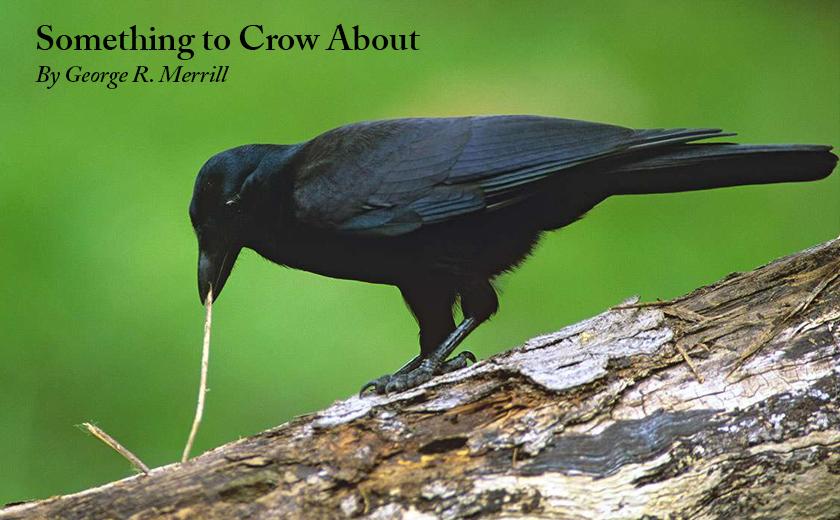Circumstances change the meaning of our words. In one sense, words are soluble in time; left to steep for a good while, they mutate. Some evolve to mean the very opposite of what they meant originally.
An article on crows appeared in The Week magazine recently. It made the same point about words but in an oblique way. What was described gave a whole new meaning to the old saying, “bird brain.”
In 2002, crows first came to the attention of naturalists and other bird watchers in New Caledonia. The crows demonstrated some remarkable skills not thought possible before. Naturalists have historically regarded crows as a cut above other birds when it came to problem solving skills.
The naturalists noted how, in the past, one captive crow had been able to fashion a tool by making a hook from a wire and thereby enabling him to retrieve food that would normally be in a box outside his reach.
Nothing, however, compared to this more recent revelation.
In a new experiment, eight crows were presented with an assortment of different-length cylinders that looked like straws. Individually, the straws were too small to reach food that had been secured in a box. Within five minutes, the birds put their beaks together and figured out how to attach two of the cylinders, thus fashioning a pole-like implement that allowed the crows to push the treat out of an opening in the container’s other side making it accessible to them. One bird even constructed a four-rod pole, the first known instance of any animal fabricating tools with more than two components. A commentator on the event wrote, “The finding is remarkable because the crows received no assistance or training in making these combinations.” They just kept at it until they figured it out.
About words and how they may change meaning?
An old phrase, “bird brain;” a saying that once dismissed someone as dull witted or just plain ignorant cannot apply any more. I offer the thought that today it means just the opposite of the original. “Bird brain,” in light of new data, connotes not only sagacity, but even genius and especially a knack for realizing possibilities through cooperation. I grew up thinking crows were so clueless that all they could do was squawk at each other mindlessly all day. It’s a new era. Crows have broken the glass ceiling and the constraints of bird cages in which we’ve placed so many. For serious avian watchers, crows have come up with some extraordinary feats . . . and at that, from their own bird brains.
Since then, researchers have documented not only their extraordinary intelligence, but more significantly, in my view, their ability to cooperate as a team in fashioning new tools to serve their needs.
There was a time when it was popularly understood that our evolution as a species depended on a survival of the fittest. Although Charles Darwin’s theory of natural selection is more complicated, the idea many held from it for many years was that dominance and power seized the day, and weakness was consigned to annihilation.
In Carter Phipps’s recent book, Evolutionaries; Unlocking the Spiritual and Cultural Potential of Science’s Greatest Idea, he develops the thought that it is not the species that dominates which survives, but the species that has learned cooperation as the ultimate non-zero-sum game. Just why other species catch on to that more quickly than man does I do not know. I would suspect with all the destructive power in human hands, time to figure it out is not on our side.
An incidental observation: As I worked on the final editing of this piece, my wife called me into the other room to say that our president was on TV notifying the country that he was ordering the reopening of the government. He added, however, that if he did not get his wall in three weeks, he would either shut the government down again or invoke extraordinary powers to have the wall built.
It was just the timing of the news that evoked this silly thought: do you suppose if we got 535 crows working on the problem, (the same number constituting our congressional members), that they’d find a way to make this thing work out for everyone? My guess? You bet they would!
Now that would be something to crow about.



Write a Letter to the Editor on this Article
We encourage readers to offer their point of view on this article by submitting the following form. Editing is sometimes necessary and is done at the discretion of the editorial staff.